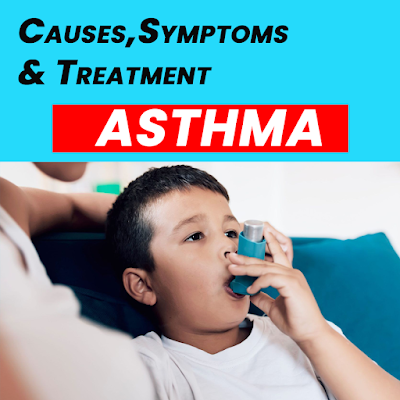Millions of adults worldwide suffer from the chronic respiratory disease known as asthma. It causes symptoms including wheezing, coughing, shortness of breath, and tightness in the chest. Airways that are inflamed and constricted are some other symptoms of asthma.
The following are some causes of asthma that contribute to its development:
Genetics: A family history of asthma or other allergic conditions can increase One's susceptibility to asthma.
Allergens: Exposure to allergens can trigger asthma symptoms in individuals with allergic asthma.
Respiratory Infections: Viral respiratory infections, especially in childhood, can increase the risk of developing asthma.
Environmental Factors: Tobacco smoke, air pollution, workplace irritants, and chemical exposure can exacerbate asthma symptoms or contribute to its development.
Obesity: It is a risk factor for asthma as it can lead to inflammation and reduced lung function.
Asthma symptoms vary in severity and frequency among individuals. Common symptoms of asthma in adults include:
Wheezing: Respiration that makes a high-pitched whistling sound, especially while exhaling.
Coughing: A persistent, often dry cough that may worsen at night or in response to triggers.
Shortness of Breath: Difficulty in breathing, often accompanied by tightness in the chest.
Chest Tightness: A potentially uncomfortable sense of pressure or tightness in the chest.
Increased Mucus Production: Airways may produce excess mucus, leading to congestion.
The following are some treatments for asthma in adults that effectively manage asthma.
1. Lifestyle Management:
Identify Triggers: Understanding and avoiding asthma triggers, such as allergens or irritants, can help prevent symptoms.
Regular Exercise: Maintaining physical fitness can improve lung function and overall health.
Dietary Choices: A healthy diet with anti-inflammatory foods may help reduce symptoms.
Stress Management: Stress can exacerbate asthma, so stress-reduction techniques like meditation and doing yoga will be beneficial.
2. Asthma Action Plan: Working with an asthma doctor to develop a personalised asthma action plan helps individuals recognize and manage symptoms effectively.
3. Monitoring: Regular monitoring of lung function through peak flow metres or spirometry can help track asthma control.
Asthma in adults is a chronic respiratory condition that is featured by airway inflammation and narrowing, leading to various symptoms. Asthma can be effectively managed through asthma treatment, lifestyle adjustments, and a personalised action plan. By identifying and avoiding triggers, staying vigilant, and working closely with healthcare professionals, individuals with asthma can lead healthy, active lives while minimising the effect of this condition on their daily activities. Regular check-ups are essential for maintaining asthma control and overall well-being.
For More References Visit us
https://bharathomeopathycure.blogspot.com/2023/09/asthma-treatments-your-key-to-symptom.html
https://www.minds.com/newsfeed/1545678929447096326?referrer=bharathomeopathy2810

.png)




.png)